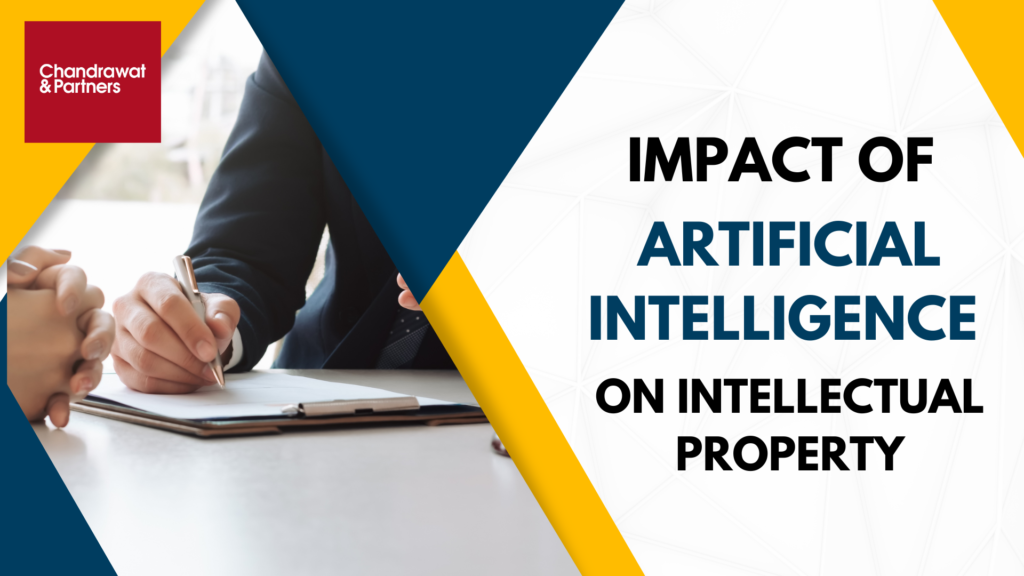Edit Content
Edit Content
Edit Content

The legal category of intellectual property safeguards human creations. Inventions, designs, brands, and other creative works can all be protected through the application of these rights. By allowing creators to manage how their work is used and distributed, intellectual property law encourages innovation.
A class of legal rights known as intellectual property safeguards human creations. Inventions, designs, logos, and other works of creativity can all be protected using these rights. By allowing creators to manage the use and distribution of their work, intellectual property law serves to encourage innovation.
Machines with artificial intelligence can mimic human cognitive functions. This covers the capacity for knowledge, analysis, and judgment. Numerous industries, including healthcare, banking, manufacturing, and logistics, have adopted AI in various ways.
The creation of new goods and services is one of the most significant applications of AI. New designs, prototypes, and even full items can be produced with AI. These items are frequently superior to those made by humans. For instance, Google’s AlphaGo program defeated a world champion in the board game Go, which is regarded as one of the most difficult to learn.
AI can be used to enhance current products in addition to developing new ones. AI can be used, for instance, to improve logistics and manufacturing operations. AI can also be used to make products and services easier to use.
The use and protection of intellectual property are governed by a body of law known as intellectual property law. Patents, copyrights, trademarks, and trade secrets fall under this category. By allowing creators to manage how their work is used and distributed, intellectual property law encourages innovation.
One of the most important aspects of intellectual property law is the concept of exclusive rights. This gives creators the exclusive right to use their works for a set period. Those who have a patent, for example, have the exclusive right to produce, utilize, and market their ideas for 20 years. Copyright holders had the exclusive right to reproduce, distribute, and perform their original works for 70 years after their passing.
The illegal use of another person’s intellectual property is known as infringement. This can involve employing a work that is protected by a copyright without consent, utilizing a patented invention without a license, or unauthorized use of a branded name or logo. A trade secret can also be violated if it is used without permission.
In recent years, artificial intelligence (“AI”) has developed significantly, resulting in a wide range of applications in industries like law, finance, and medicine. It is crucial to consider the effects of these developments on intellectual property (“IP”) law as AI systems become more advanced and capable of producing creative works and discoveries.
Online intellectual property violation is another area where AI is influencing the law. AI is being utilized to automate the takedown procedure and assist in the identification of potentially illegal internet content.
For instance, Google’s “Content ID” technology makes use of AI to detect copyrighted content in videos automatically. Then, YouTube gives copyright owners the choice of either removing the videos or making money off of them by placing advertising on them.
Similar to how YouTube utilizes AI to detect videos with copyrighted content, Facebook’s “Rights Manager” technology does the same. Then, Facebook provides the rights holders the choice of either removing the videos or making money off of them by placing advertisements on them.
Additionally, Amazon’s “Brand Registry” technology makes use of AI to assist brands in finding and removing infringement-related listings from its marketplace.
The issue of trademark registration is another area where AI is having an impact on intellectual property law. The trademark registration procedure, which has historically been labor-intensive and manual, is now being automated by artificial intelligence (“AI”). For instance, the “Trademark Bot” chatbot from Trademark Engine assists consumers in requesting federal trademark protection. The bot queries the user’s company before generating a finished trademark application. Similar to this, the “Logo Maker” on LegalZoom uses AI to create logos for businesses. Users are prompted with a series of questions about their businesses before the service produces a logo that is custom-made to their needs. These instances demonstrate how AI is starting to automate the trademark registration procedure, which will probably make it more user-friendly and effective.
The impact of AI on intellectual property law cannot yet be predicted. To keep up with the quick growth of AI, the law will need to change.
The issue of ownership will need to be addressed. Who is the owner of an AI-made work? Is it the machine itself, the business that developed the AI program, or the person in charge of making sure it runs efficiently? There are no simple solutions to this difficult subject. However, if we want to prevent stifling innovation and creativity, it is a problem that must be solved. The problem of infringement is another issue that needs to be resolved. Is it considered an infringement if an AI algorithm produces a piece that resembles another copyrighted work?
There are no simple solutions to this complex subject either. However, it is crucial to take this into account because, in the future, works made by AI are probably going to be more prevalent.
All things considered; AI is significantly changing intellectual property law. AI is also being used to automate the trademark registration process and assist in the identification of potentially illegal web content. Lastly, artificial intelligence is being utilized to assist companies in safeguarding their trade secrets from rivals. AI is anticipated to have a greater impact on intellectual property law as it develops.
Our specialized approach and industry knowledge allow us to offer complete trademark solutions.
For more information or queries, please email us at
[email protected]

Managing Partner
Copyright © Chandrawat & Partners. All Rights Reserved.
Copyright © Chandrawat & Partners. All Rights Reserved.

Chandrawat & Partners stands as a dynamic and rapidly expanding full-service firm, specializing in the delivery of exceptional professional and corporate services to a diverse clientele, both foreign and local. We proudly represent companies and individuals across a wide spectrum of sectors through distinct entities established in various countries worldwide.
ASIA
AFRICA
EUROPE
NORTH AMERICA
SOUTH AMERICA
OCEANIA
Chandrawat & Partners uses cookies to run our site and improve its usability.
By using our site you agree to our use of Cookies.